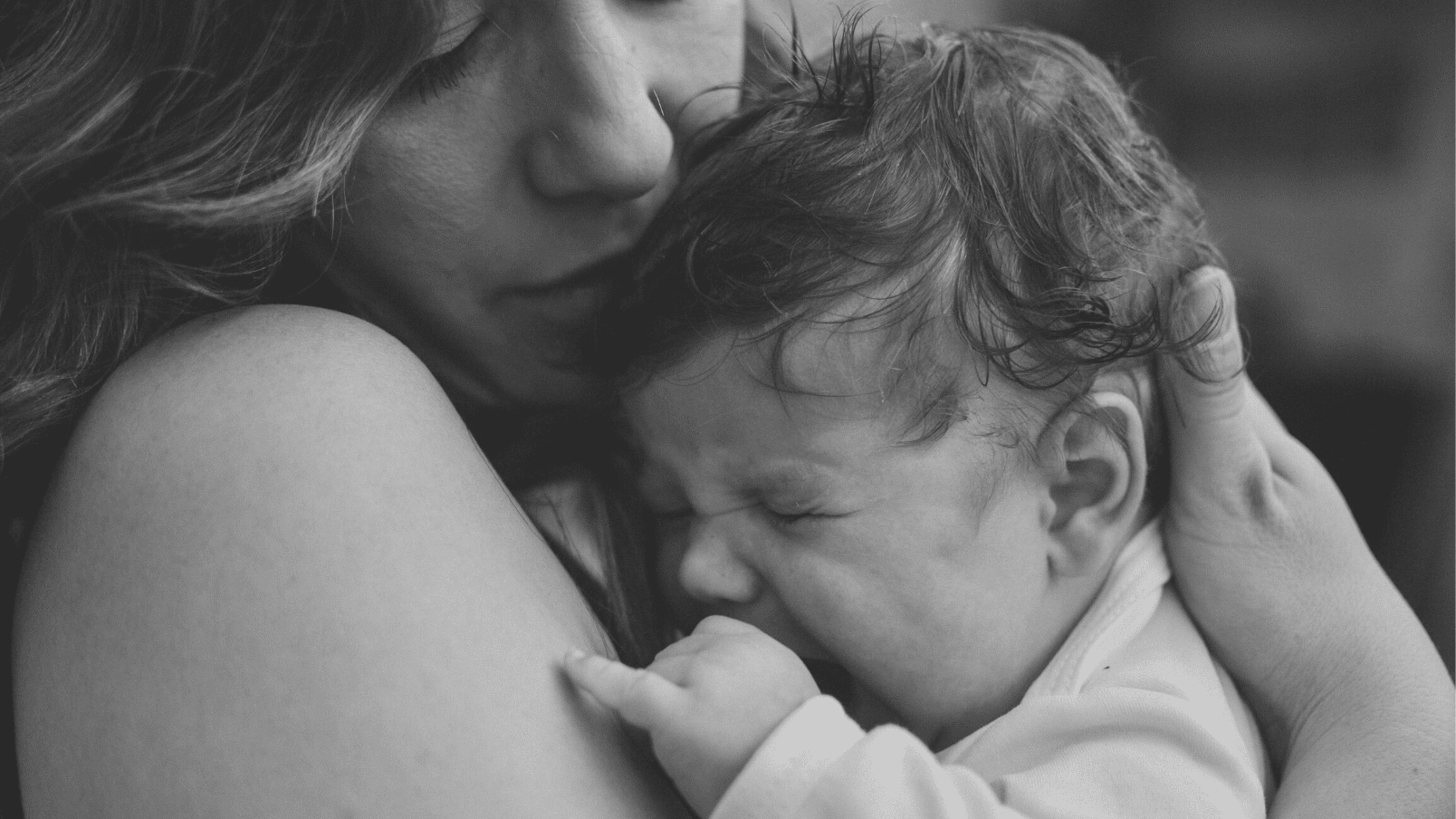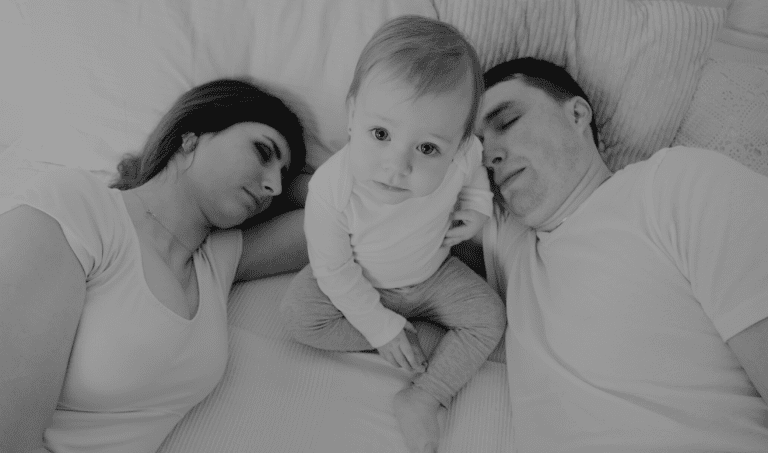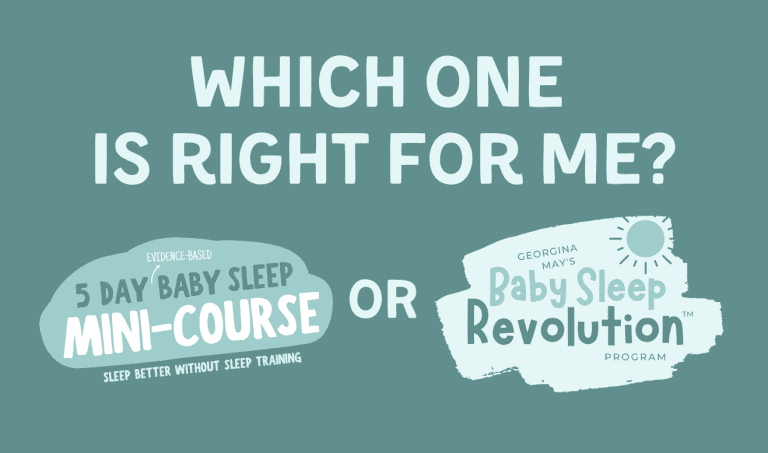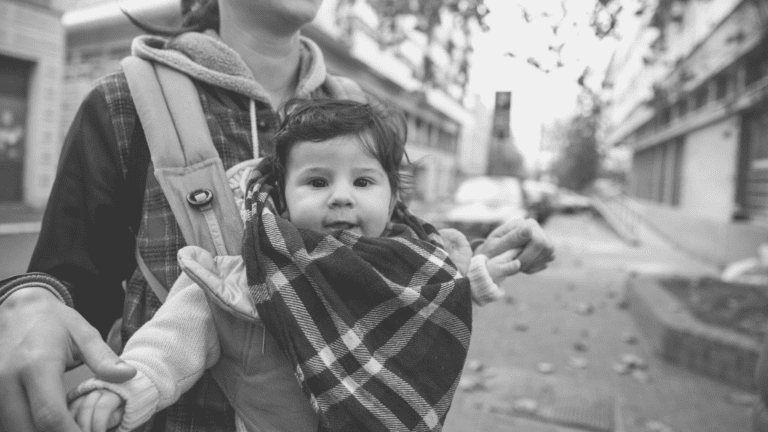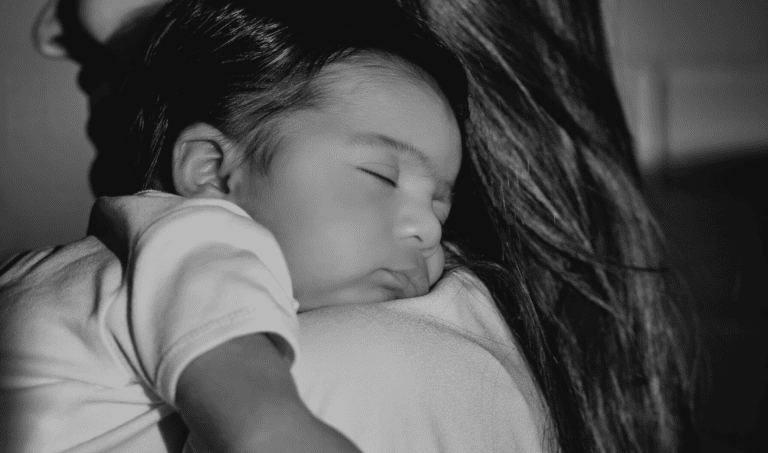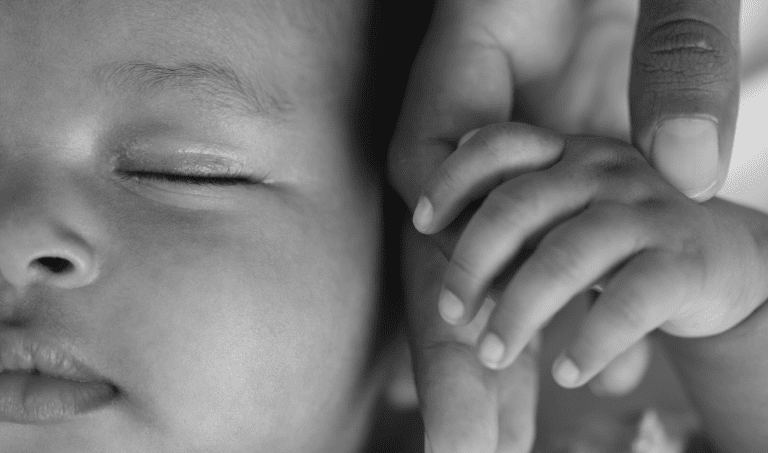This is one of the most common questions I get asked! So many parents want to know whether their baby or toddler’s sleep pattern is ‘normal’ or whether they should be concerned about night wakefulness.
If this question has been on your mind too, you’re in the right place!
Keep reading to find out what the evidence says about what’s likely to be ‘normal’ (typical) vs what may be considered excessive when it comes to night waking for babies and toddlers…
What’s considered ‘normal’ when it comes to night waking? What does the research tell us?
In short: from a scientific perpective it’s 100% biologically normal for babies and even toddlers and young children to wake at night and need help from a parent or caregiver.
We have to remember that it’s common for adults and older children to wake at night too – to go to the bathroom, get a drink of water, rearrange the sheets, or if they’ve had a bad dream. The difference is that adults and older children can usually solve their own problems when they wake at night, while babies and younger children are more likely to need help from a parent or caregiver to solve their problems, and – in many cases – to fall back asleep.
There appears to be quite a wide variation when it comes to the age at which little ones no longer need help from a parent or caregiver at night. This is because every child is wired differently – they all have different needs and preferences when it comes to settling, nutrition/hydration, and comfort/reassurance.
While some little ones (unicorn babies!) naturally ‘sleep through the night’ from quite early on (sometimes in the newborn period), others continue to wake at night and need help from a parent or caregiver – at least some of the time – well into toddlerhood and sometimes beyond.
Sleeping through the night’ (STTN) is often talked about like it’s a ‘milestone’ to be achieved at some point in the first 12 months of life, but it’s actually FAR less common than we’re led to believe…
A 2015 study out of Ireland – for example – found a whopping 84% of 9-month-old babies were reported to wake and signal to their parent or caregiver at night [1]. So if you’ve been sitting there worrying because your baby is *still* waking a few times overnight, you can almost certainly relax!
And even if your toddler is waking a few times at night for a quick feed or resettle, it’s more than likely just their ‘norm’. While ‘sleeping through the night’ becomes more common as little ones grow and develop (especially from the second year), many toddlers and young children still wake up during the night and need help from a parent or caregiver to solve their problems and/or fall back asleep.
While parents often feel pressured to ‘teach’ their baby to self-settle and to sleep train, please know that this is not necessary (and many little one’s won’t respond to it anyway). You don’t need to do anything to speed up the transition to ‘independent sleep’ – in fact you can’t.
The good news is, there will come a time when your little one doesn’t need you anymore at night. It will happen when they’re ready. Until then, it’s 100% okay (and actually really good from a brain development perspective!) to continue to respond to their needs at night in whatever way works best for them and you.
How many wakes is ‘normal’?
This is a tricky question because the answer isn’t black and white! It’s not like there’s a hard cut off – a maximum number of wakes that’s considered ‘normal’, with anything more than that considered ‘excessive’.
When it comes to how many wakes is normal for babies and toddlers, research suggests that ‘normal’ is likely to be quite a wide range.
In the newborn period, it’s typical for babies to wake every couple of hours at night to feed. But there will be some who sleep longer stretches, and others who wake a little more often and they’re also considered to be ‘normal’ (as in there are no concerns when it comes to health or development).
While it’s common for babies to begin sleeping for longer stretches overnight as they emerge from the newborn period, there are still a percentage of older babies and even some toddlers who continue to wake relatively frequently (every few hours), and there’s no cause for concern.
If we look at 9-month-old babies for example – at one end of the spectrum research has found a small percentage (~16%) are reported by parents to sleep through the night [1], while at the other end, 3-4 wakes/feeds overnight (in some cases maybe even a few more than that) may be ‘normal’ / nothing to worry about, especially amongst babies who are breastfed and bed-share – a practice known as ‘breast-sleeping’ [2].
In saying all of this, it’s important to be aware that not all night waking is ‘normal’. The more wakeful a little one is, the greater the possiblity that something (e.g. a health condition, separation stress, low sleep pressure) may be causing them to be more wakeful than they naturally should/would be.
So if you have any concerns and/or your gut instinct is telling you something may not be quite right, it’s important to investigate further.
When is night waking considered excessive?
Night waking is likely to be excessive if a little one is:
- Waking hourly / every sleep cycle (40-60 mins) or more often – either for a period of the night or all night long
- Wide awake or restless for extended periods
- Taking a long time to resettle after waking
- More wakeful than they have been in the past – e.g. they were in quite a predictable sleep pattern where they were usually waking once overnight, but now they’re waking 4-5 times
In these situations, there’s almost always an underlying reason / cause for the wakefulness.
Sometimes this level of wakefulness is just a blip. Caused by a temporary illness, long-distance travel, changing sleep patterns or sleep needs or a stressful event or change (e.g. starting daycare, moving house). In most cases things settle back down within a few weeks.
But other times excessive wakefulness can become chronic – continuing for weeks or months – and a little one is very wakeful either every night, or is riding a bit of a ‘sleep rollercoaster’, having strings of ‘good’ nights followed by strings of wakeful nights.
When this is the case, it’s important to investigate further, starting with a visit to your child’s health professional to consider possible health-related causes.
If health-related causes have been ruled out – please know there is still a light! In most cases it IS possible to improve the nights and get into a restful and predictable sleep pattern – without any form of sleep training – even if you feel like you’ve tried EVERYTHING!
How can I help my wakeful baby or toddler sleep soundly for decent stretches at night?
The first step is to work out what’s causing the wakefulness.
Because once you know why your little one is wakeful, you’ll not only be able to address any underlying causes (e.g. health-related causes, unmet needs, or low sleep pressure), the nights should be a whole lot more restful too!
If your concerns are primarily health-related, your best next step is to investigate further with a health professional.
If you’re certain the wakefulness is not health-related and you’d like help to investigate the other possible causes of wakefulness, my 5 Day Baby Sleep Mini-Course is a great next step!
It’s designed to help you work through the possiblities and pinpoint the likely reason/s why your little one is waking, and make evidence-based tweaks and changes to help improve their sleep WITHOUT any form of sleep training.
Feel like you’ve already tried EVERYTHING?
You’re definitely not alone! So many of the parents who come across me feel the exact same way.
It’s a minefield out there. When it comes to baby and toddler sleep, there’s just so much misinformation and conflicting information. It can be really hard for parents to find effective alternatives to sleep training. But they do exist!
Sleep science and research is constantly evolving and excitingly there are a growing number of evidence-based approaches and sleep solutions that can help you improve your little one’s sleep pattern while continuing to respond to them at night in whatever way works best.
Sometimes just making a few tweaks and changes is all that’s needed to get your little one into a restful and predictable sleep pattern (this is what I share in my 5 Day Baby Sleep Mini-Course).
But if you feel like you’ve already tried EVERYTHING, please don’t leave this website without taking a look at my Baby Sleep Revolution™ program. It’s a very unique program that’s helped so many parents struggling with wakefulness when literally nothing else has (even other evidence/sleep science-based approaches and solutions)!
I developed the Baby Sleep Revolution™ program because I found that some little ones – especially babies and toddlers with low sleep needs – seem to be more sensitive/prone to wakefulness. They can sleep soundly at night for decent stretches, but need a bit more help – a more precise approach – to get there.
The Baby Sleep Revolution™ program guides you through a unique, step-by-step process that can help you optimize your little one’s sleep pattern so they sleep for longer stretches at night, consistently going forward.
Finally – an alternative to sleep training that actually works!
– Jade, Baby Sleep Revolution program
If you’re interested in finding out more about it, be sure to watch the video partway down the program page (via the button below) which will give you an overview of the process and help you work out if the program is likely to be a good fit for you / your situation.
If it is, I’d love to help you get to a much better place (and feel human again)!

PS – not sure which option is best for you & your situation? This should help you decide!
REFERENCES:
[1] Hughes, A., Gallagher, S., & Hannigan, A. (2015). A Cluster Analysis of Reported Sleeping Patterns of 9-Month Old Infants and the Association with Maternal Health: Results from a Population Based Cohort Study. Maternal and child health journal, 19(8), 1881–1889. https://doi.org/10.1007/s10995-015-1701-6
[2] McKenna, J. J., Mosko, S. S., & Richard, C. A. (1997). Bedsharing promotes breastfeeding. Pediatrics, 100(2 Pt 1), 214–219. https://doi.org/10.1542/peds.100.2.214


